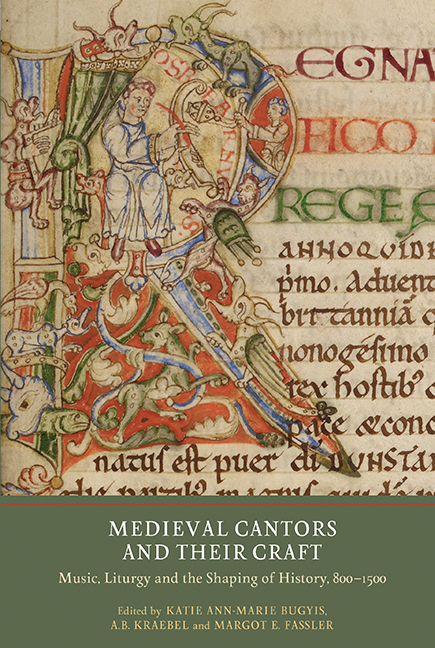Book contents
- Frontmatter
- Dedication
- Contents
- List of Illustrations
- Contributors
- Acknowledgments
- Abbreviations
- Miscellaneous Frontmatter
- Introduction
- PART I The Carolingian Period
- PART II The Eleventh Century
- PART III England in the Twelfth Century
- 9 Cantor, Sacrist or Prior? The Provision of Books in Anglo-Norman England
- 10 Symeon of Durham as Cantor and Historian at Durham Cathedral Priory, c. 1090–1129
- 11 Reshaping History in the Cult of Æbbe of Coldingham
- 12 William of Malmesbury as a Cantor-Historian
- 13 Lex orandi, lex scribendi? The Role of Historiography in the Liturgical Life of William of Malmesbury
- 14 Of the Making of Little Books: The Minor Works of William of Newburgh
- PART IV On the Continent: Five Case Studies
- Index of Manuscripts
- General Index
- Miscellaneous Endmatter
12 - William of Malmesbury as a Cantor-Historian
from PART III - England in the Twelfth Century
Published online by Cambridge University Press: 25 October 2017
- Frontmatter
- Dedication
- Contents
- List of Illustrations
- Contributors
- Acknowledgments
- Abbreviations
- Miscellaneous Frontmatter
- Introduction
- PART I The Carolingian Period
- PART II The Eleventh Century
- PART III England in the Twelfth Century
- 9 Cantor, Sacrist or Prior? The Provision of Books in Anglo-Norman England
- 10 Symeon of Durham as Cantor and Historian at Durham Cathedral Priory, c. 1090–1129
- 11 Reshaping History in the Cult of Æbbe of Coldingham
- 12 William of Malmesbury as a Cantor-Historian
- 13 Lex orandi, lex scribendi? The Role of Historiography in the Liturgical Life of William of Malmesbury
- 14 Of the Making of Little Books: The Minor Works of William of Newburgh
- PART IV On the Continent: Five Case Studies
- Index of Manuscripts
- General Index
- Miscellaneous Endmatter
Summary
William of Malmesbury would seem, at first sight, to represent the perfect example of a ‘cantor-historian’. The author of three major histories, an extensive collection of Marian miracles and five finely constructed saints’ lives, he is often acclaimed as one of the greatest historians of his era. There is also no doubt that he spent some part of his career as his monastery's cantor. To be sure, William nowhere presents himself to his readers as such. The closest that he comes to doing so is in the preface to the Historia novella, where he styles himself as bibliothecarius Malmesberie, as ‘the librarian of Malmesbury’. Many customaries place the care of a monastery's book collection among the cantor's usual duties, but this task was sometimes detached from the core role of managing the delivery of the liturgy. Lanfranc's decrees provide, for example, for the delegation of this job if the cantor lacks the skills and character to discharge it properly: ‘De universis monasterii libris curam gerat, et eos in custodia sua habeat, si eius studii et scientie sit, ut eorum custodia ei commendari debeat’ (‘[The cantor] takes care of all the books of the house, and has them in his keeping, if his interests and learning are such as to fit him for keeping them’). It follows that the words which William has chosen leave open the possibility that he fulfilled the duties of librarian without being a cantor in the usual sense. Evidence that he was indeed his community's cantor emerges from an external source, Robert of Cricklade. Writing in or soon after 1137, while William was still alive and active, Robert defines him as a monk and cantor of the ecclesia at Malmesbury. Since he had read some of William's works and was a canon of Cirencester, a collegiate community located some twelve miles from Malmesbury, before going on to become abbot of St Frideswide's in Oxford, it is reasonable to assume that he is an authoritative guide to the truth of the matter.
That being a cantor informed William's activities as an author and scribe also seems clear enough, but from texts and remains that might be considered peripheral to his achievement. Neil Ker detected William's hand in several books, one of which is especially relevant to the cantor's office, that is, Bodl Auct. F.3.14 (SC 2186).
- Type
- Chapter
- Information
- Medieval Cantors and their CraftMusic, Liturgy and the Shaping of History, 800-1500, pp. 222 - 239Publisher: Boydell & BrewerPrint publication year: 2017

